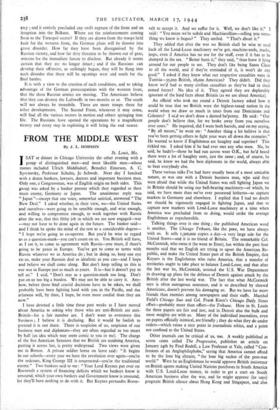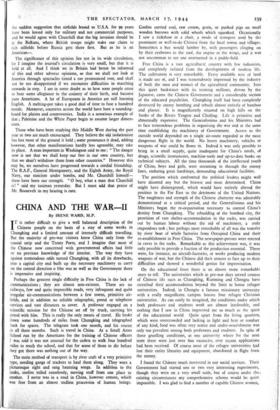FROM THE MIDDLE WEST
By J. L. HODSON
St. Louis, Mo. I SAT at dinner in Chicago University the other evening with a
group of distinguished men—and most likeable men—whose names included Ulrich Middledorf, Benedict Einarson, A. C. Spectorsky, Professor Schultz, Jo Schwab. Next day I lunched with a dozen bankers, lawyers, doctors and important business men. Only one, a Congressman, was of English origin on both sides. This group was asked by a banker present which they regarded as their main enemy, Germany or Japan. The unanimous reply was " Japan "—except that one voice, somewhat satirical, answered " The New Deal." I asked whether, in their view, we—the United States and ourselves—were going to be sensible enough, and wise enough, and willing to compromise enough, to work together with Russia after the war, that this filthy job in which we are now engaged—war —may not have to be done again in the future. The banker said— and I think he spoke the mind of the rest to a considerable degree- " I hope we're going to co-operate. But you'd be wise to regard us as a question-mark—you can't count on us. You British will have, as I see it, to come to agreement with Russia—you must, if there's going to be peace in Europe. You've got to come to terms with Russia whatever we in America do ; but in doing so, keep one eye on us, make your Russian deal as idealistic as you can—and I hope and believe we shall come along. But don't keep telling us this is our war in Europe just as much as yours. It is—but it doesn't pay to tell us." I said, " Don't stay as a question-mark too long. Don't put on us too big a burden. We may not be able to carry it. Any- how, before those final crucial decisions have to be taken, we shall probably have been fighting hard with you in the Pacific, and dui relations will, by then, I hope, be even more cordial than they are now."
I have devoted a little time these past weeks as I have moved about America to asking why those who are anti-British are anti- British—for a fair number are. I don't want to overstress this business ; I believe it is declining. But it would be foolish to pretend it is not there. There is suspicion of us, suspicion of our business men and diplomats—they are often regarded as too smart by half (an idea which may seem comic to you or me). The charge of the five American Senators that we British are outdoing America, putting it across her, is pretty widespread. Two views were given
me in Boston. A private soldier home on leave said: " It begins in our schools—every year we have the revolution over again—you're the redcoats, King George III is resurrected—you're the traditional enemy." Two bankers said to me: " Your Lord Keynes put over on Roosevelt a system of financing deficits which we bankers know is unsound, which your own bankers and Government know is unsound, for they'll have nothing to do with it. But Keynes persuades Roose-
velt to accept it. And we suffer for it. Well, we don't like it." I said : " You mean we're subtle and Machiavellian—selling you some- thing we know is bogus?" They smiled. ." That's about it."
They added that after the war. we British shall be wise to send back all the Lend-Lease machinery we've got, machine-tools, trucks, jeeps, even if America has no use for the stuff, even if it has to be dumped in the sea. " Better burn it," they said, " than leave it lying around for our people to see. They don't like being Santa Claus to all the world, and if they're reminded of it, it won't do any good." I asked if they knew what our respective casualties were in Tunisia-35,00o British, 113,000 American? They didn't. Did they know we'd had as many civilian casualties as they've had in their armed forces? No idea of it. They agreed they are deplorably ignorant of the hard facts about Britain (as we are about America).
An official who took me round a Detroit _factory asked how it could be true that we British were the highest-taxed nation in the world when we draw so much in taxes from our Dominions and Colonies? I said we don't draw a darned ha'penny. He said: " Our people don't believe that, for we broke away from you ourselves over taxes." He inquired, did I want both barrels, and on my saying, " By all means," he went on: " Another thing a lot believe is that you've been getting others to fight your wars all down the centuries." He wanted to know if Englishmen are haughty and superior? This tickled me. I asked him if he had ever met any who were. No, he said, he hadn't—those he had run across were OA., but he'd heard there were a lot of haughty ones, just the same ; and, of course, he said, he knew we had the best diplomats in the world, always able to beat everybody else.
These various talks I've had have usually been of a most amicable nature, as was one with a Detroit business man, wilt) said they were afraid that while the United States was still fighting Japan we in Britain should be using our ball-bearing machinery—of which, he said, we have more than we've ever possessed hitherto—to capture markets in Germany and elsewhere. I replied that I had no doubt we should be vigorously engaged in fighting Japan, and that to capture new markets with Lend-Lease machinery at a time when America was precluded from so .doing, would strike the average Englishman as reprehensible.
Talking things over is one thing ; the published American word is another. The Chicago Tribune, like the poor, we have always with us. It sells 1,3oo,000 copies a day—a very large sale- for the United States—and it is no friend of Britain. The remarkable Col. McCormick, who owns it (he went to Eton), has within the past four months said that we English are trying to upset the American Re- public, and make the United States part of the British Empire, that Keynes is the Englishman who rules America, that a transfer of territories ought to take place to balance Lend-Lease, and that after the last war he, McCormick, assisted the U.S. War Department in drawing up plans for the defence of Detroit against attack by the British after the last world war. The fact that what .McCormick says is often outrageous nonsense, and is so described by shrewd Americans, doesn't prevent his damaging us. But we have far more friends than enemies among newspapers and their staffs. Marshal Field's Chicago Sun and Col. Frank Knox's Chicago. Daily News offset—probably more than offset—the Tribune. Here in St. Louis the three papers are fair and just, and in Detroit also the bulk and most weighty are with us. Many of the individual journalists, even on papers officially inimical, are friendly ; they do what they do under orders—which raises a nice point in journalistic ethics, and a point not confined to the United States.
Other journals can be critical of us, too. A weekly published at seven cents called The Progressive, publishes an article on January 24th by Fred Roden, a Law Professor at Yale, called " Con- fessions of an Anglophilephobe," saying that America cannot afford to be the lone big altruist, " the lone big sucker of the post-war world." Were he an Englishman he would approve British insistence on British agents making United Nations purchases in South America with U.S. Lend-Lease money, in order to get a start on South American business after the war, and he might approve (he says) pregnant British silence about Hong Kong and Singapore, and also
the sudden suggestion that airfields leased to U.S.A. for 99 years have been leased only for military and not commercial purposes, and he would agree with Churchill that the big invasion should be in the Balkans, where British troops might stake our claim to rich oilfields before Russia gets there first. But as he is an American—.
The significance of this opinion lies not in its wide circulation, for I imagine the journal's circulation is very small, but that it is held at all. And I think we in Britain had better be informed of this and other adverse opinions, so that we shall not look at America through spectacles tinted a too pronounced rose, and shall not be too disappointed if we encounter difficulties in marching onwards in step. I am in some doubt as to how soon people cease to bear some allegiance to the country of their birth, and become pure Americans. A lot of Europeans in America are still learning English. A melting-pot takes a good deal of time to fuse a hundred metals. Moreover, countries across the world have here a sounding- board for plaints and controversies. India is a notorious example of that ; Palestine and the White Paper begin to assume larger dimen- sions.
Those who have been studying this Middle West during the past year or two are much encouraged. They believe the old isolationism has lost most of the ground it held ; some pronounce it dead, adding however, that other manifestations hardly less agreeable, may take its place. A man important in Washington said to me : " The danger now is not that we shall keep our feet in our own country, but that we shan't withdraw them from other countries." However this may be, we ourselves have progressed towards a cordial friendship. The R.A.F., General Montgomery, and the Eighth Army, the Royal Navy, our stoicism under bombs, and Mr. Churchill himself— these have been our strength. " 0 boy, what a man that Churchill is! " said my taximan yesterday. But I must add that praise of Mr. Roosevelt in my hearing is rare.



























 Previous page
Previous page